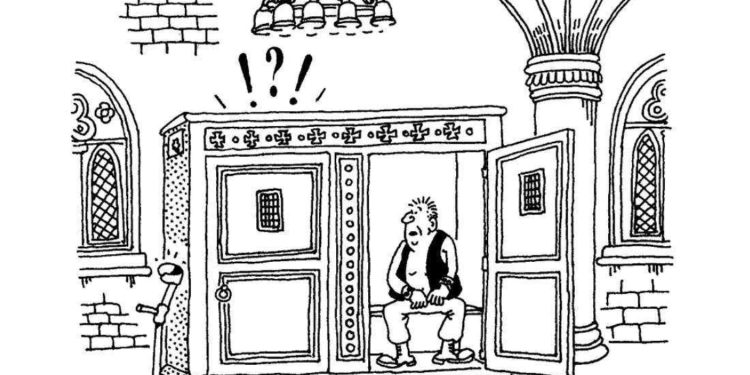“I hope you’re not in a hurry, Father. My last confession was forty years ago!” (Illustration: Tom Adcock)
Jesus said, “As the Father has sent me, I am sending you . . . If you forgive anyone’s sins, their sins are forgiven!” (John 20:21-23)
Let me start with a true story. I remember it like the day of yesterday though it happened a long time ago— in the 1960s.
I was visiting a friend of mine, the Rev Robert Marsh, in his home on Abids Road, Secunderabad, India. Robert was the local vicar for the Church of South India. As we were having a cup of tea in his lounge, an acquaintance of his passed by who ministered as an evangelical preacher.
When the preacher discovered that I was a Catholic priest, he launched an attack. “You priests claim you can forgive sins, don’t you?”
“Yes”, I replied.
“Well, that is the height of Catholic arrogance! Just think of it. God is the almighty ruler of the universe and sins are offenses against him. Admit: offenses against the highest power that exists. And you claim you can forgive them!”
“Jesus gave us authority to do so”, I said.
“Did he? Prove it to me!”
I asked Robert Marsh for a copy of his Bible. Then I read out this passage from Jesus’ appearance to the apostles after his resurrection.
‘Jesus said, “Peace be with you! As the Father has sent me, I am sending you.” And with that he breathed on them and said, “Receive the Holy Spirit. If you forgive anyone’s sins, their sins are forgiven; if you do not forgive them, they are not forgiven”.’ (John 20:21)
It stunned him. “I’ve never come across that passage”, he stammered. He grabbed the Bible from my hands to see if the text was truly there.
Forgiving sins
The Gospel of Luke narrates a truly revealing incident in Jesus’ life (Luke 5:17-26). Jesus was teaching inside a house. Crowds surrounded him both inside the building and in the adjoining courtyard. Some men approached carrying a paralyzed man on a litter. They did not know how to get their friend to Jesus. In the end, they found a solution. They climbed a staircase at the back of the house and reached the flat roof. They then removed some flagstones from the roof, creating a hole through which they lowered the man in front of Jesus’ feet.
Commotion! But Jesus appreciated their faith. He must have talked to the paralytic. Then he told him: “Your sins are forgiven.”
Some scribes and Pharisees who were present in the room were scandalized. “How can he presume to forgive sins? Only God can forgive sins!”
Jesus turned to them and said: “To show you that I have the power to forgive sins on earth in the name of God, see what I am doing now!” He told the paralyzed man: “Stand up. Take up the litter and go home!” That is what the man did.
Being able to forgive sins in God’s name is indeed extraordinary. Yes, Jesus gave his ministers incredible power. This power even devolves to anyone of his followers in special circumstances, as I will show in a later reflection.
Jesus gave his ministers incredible authority. But it is worth reflecting on what kind of authority.
Question
- Are we sufficiently aware of the fact that Church authority is spiritual authority? That means a different sort of authority, the authority that derives from ‘God’, the deepest dimension underlying the universe, the mysterious power that pervades reality as we know it?
Published by arrangement with the Wijngaards Institute for Catholic Research
*The views expressed in this article are those of the author and do not necessarily reflect the official editorial position of UCA News.
Credit: Source link




